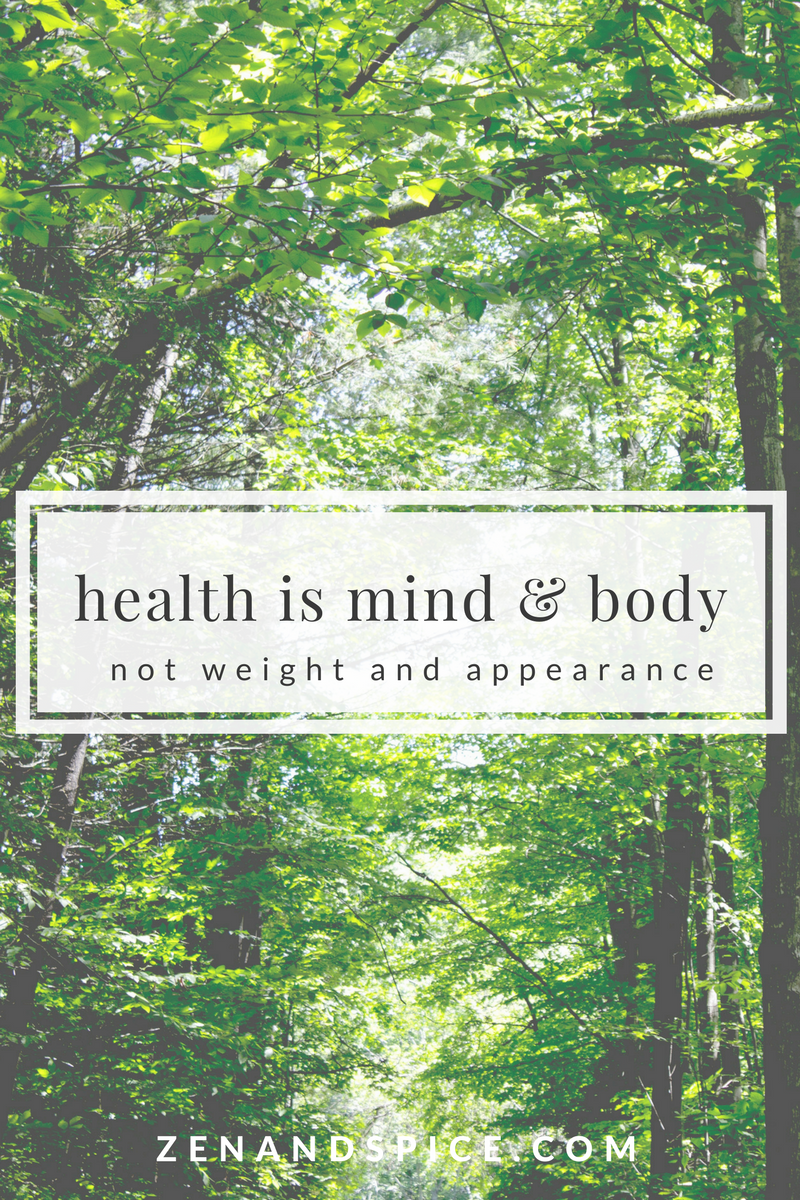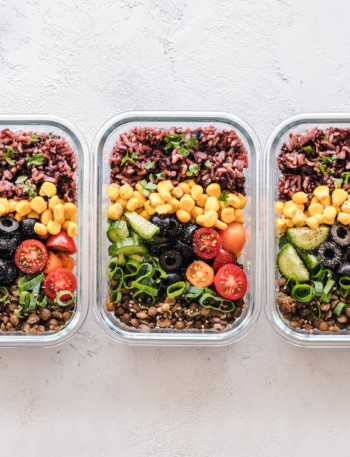There’s a small, yet mighty, movement happening in the world of health and nutrition. The concept of intuitive eating (IE) has been around for a long time, but only until recently it’s started to get the attention it deserves. I wanted to write a post to summarize IE for you, since I write about it so frequently on the blog but haven’t officially defined it for you!

What is Intuitive Eating?
Intuitive eating is a mindset. It’s a HUGE shift in mindset for so many people. Our country (and world) is so inundated with dieting messages, that many of us have been stuck in the dieting mindset for most of our lives. Dieting is miserable: it causes us to feel as if we failed, when really, it’s the diet that failed us. Our bodies aren’t meant to restrict and binge then restrict again– this never ending cycle of diets.
Intuitive eating means paying attention to your body’s natural hunger and fullness signals, which helps create a healthy relationship with food, mind and body. It’s also known as the non-diet approach, normal eating, and mindful eating. One of my favorite IE bloggers, Kylie, explains several myths around IE in this post. Eating intuitively means you’re free to eat whatever you want, when you want, all while paying attention to your body and how certain foods make you feel.
When learning to eat intuitively, you’ll listen and reconnect with your body’s hunger and fullness cues, learn to trust yourself to make decisions around what or how much to eat, take back your power around food, reconnect to your body’s innate wisdom to determine the right amount of food for you, develop self-trust around eating challenging or “forbidden” foods, practice being more mindful at meal times in a safe and supportive environment.
The concept of weight neutrality is very important to intuitive eating. We can’t make any assumptions about a person’s health based on physical appearance (weight in particular). Everyone deserves health interventions regardless of whether it produces a change in weight.
Evelyn Tribole and Elyse Resch are the authors of the famous Intuitive Eating book, which houses the ten principles of intuitive eating. They do such a great job of explaining the principals that I don’t dare to re-write them. Make sure to check out their website and book if you’re interested in reading more.
10 Principles of Intuitive Eating
1. Reject the Diet Mentality Throw out the diet books and magazine articles that offer you false hope of losing weight quickly, easily, and permanently. Get angry at the lies that have led you to feel as if you were a failure every time a new diet stopped working and you gained back all of the weight. If you allow even one small hope to linger that a new and better diet might be lurking around the corner, it will prevent you from being free to rediscover Intuitive Eating.
2. Honor Your Hunger Keep your body biologically fed with adequate energy and carbohydrates. Otherwise you can trigger a primal drive to overeat. Once you reach the moment of excessive hunger, all intentions of moderate, conscious eating are fleeting and irrelevant. Learning to honor this first biological signal sets the stage for re-building trust with yourself and food.
3. Make Peace with Food Call a truce, stop the food fight! Give yourself unconditional permission to eat. If you tell yourself that you can’t or shouldn’t have a particular food, it can lead to intense feelings of deprivation that build into uncontrollable cravings and, often, bingeing When you finally “give-in” to your forbidden food, eating will be experienced with such intensity, it usually results in Last Supper overeating, and overwhelming guilt.
4. Challenge the Food Police Scream a loud “NO” to thoughts in your head that declare you’re “good” for eating minimal calories or “bad” because you ate a piece of chocolate cake. The Food Police monitor the unreasonable rules that dieting has created . The police station is housed deep in your psyche, and its loud speaker shouts negative barbs, hopeless phrases, and guilt-provoking indictments. Chasing the Food Police away is a critical step in returning to Intuitive Eating.
5. Respect Your Fullness Listen for the body signals that tell you that you are no longer hungry. Observe the signs that show that you’re comfortably full. Pause in the middle of a meal or food and ask yourself how the food tastes, and what is your current fullness level?
6. Discover the Satisfaction Factor The Japanese have the wisdom to promote pleasure as one of their goals of healthy living In our fury to be thin and healthy, we often overlook one of the most basic gifts of existence–the pleasure and satisfaction that can be found in the eating experience. When you eat what you really want, in an environment that is inviting and conducive, the pleasure you derive will be a powerful force in helping you feel satisfied and content. By providing this experience for yourself, you will find that it takes much less food to decide you’ve had “enough”.
7. Honor Your Feelings Without Using Food Find ways to comfort , nurture, distract, and resolve your issues without using food. Anxiety, loneliness, boredom, anger are emotions we all experience throughout life. Each has its own trigger, and each has its own appeasement. Food won’t fix any of these feelings. It may comfort for the short term, distract from the pain, or even numb you into a food hangover. But food won’t solve the problem. If anything, eating for an emotional hunger will only make you feel worse in the long run. You’ll ultimately have to deal with the source of the emotion, as well as the discomfort of overeating.
8. Respect Your Body Accept your genetic blueprint. Just as a person with a shoe size of eight would not expect to realistically squeeze into a size six, it is equally as futile (and uncomfortable) to have the same expectation with body size. But mostly, respect your body, so you can feel better about who you are. It’s hard to reject the diet mentality if you are unrealistic and overly critical about your body shape.
9. Exercise–Feel the Difference Forget militant exercise. Just get active and feel the difference. Shift your focus to how it feels to move your body, rather than the calorie burning effect of exercise. If you focus on how you feel from working out, such as energized, it can make the difference between rolling out of bed for a brisk morning walk or hitting the snooze alarm. If when you wake up, your only goal is to lose weight, it’s usually not a motivating factor in that moment of time.
10 Honor Your Health–Gentle Nutrition Make food choices that honor your health and taste-buds while making you feel well. Remember that you don’t have to eat a perfect diet to be healthy. You will not suddenly get a nutrient deficiency or gain weight from one snack, one meal, or one day of eating. It’s what you eat consistently over time that matters, progress not perfection is what counts.
Tribole, E., & Resch, E. (2012). Intuitive eating: A revolutionary program that works. New York: St. Martin’s Griffin.
My Intuitive Eating Journey
You can read about the start of my intuitive eating journey here. My honest and true intention was (and still is) to help people live happier lives– and now I know that living a happy life does not mean reaching a “goal weight”. It’s loving and accepting whatever body shape you have and treating yourself with respect. We don’t deserve to shrink ourselves down to these little, unrealistic body shapes. And we don’t have to shrink our voices either. We have to stand up and stare diet culture right in the face.
My mission for my blog moving forward is to empower women to trust in their own intuition and natural ability to create the balanced & nourished life they’re meant to live, by cultivating a thriving community that harmonizes your inner being through joyful experiences in the kitchen and in everyday life.
I truly believe that:
- We can live intuitively for ourselves. Every woman must believe in her own abilities to take care of herself and derive confidence from within.
- We can achieve inner harmony to find your healthiest mind and body. Being mindful of what nourishment and self-care you need in your everyday life helps you stay connected to your mind, body, and soul.
- Cooking can be practical and creative. Creating delicious meals doesn’t have to be complicated. Exploring the use of real foods in creative new ways will help you experience familiar, everyday ingredients in a whole new light.
- We can celebrate life through diversity. From exploring new flavors in the kitchen to new exercises that stimulate the body and mind, keeping an open mind makes each day fun and exciting. Because everyone needs a little spice in their life.
- We can find flexibility and acceptance. Let’s get rid of rigid rules or external cues that restrict you. Stay open to all possibilities by working with, not against, any challenges that come your way.
If you’re interested in learning more about intuitive eating, I would strongly encourage you to check out the books, podcasts and blogs below!
Intuitive Eating Books
- Intuitive Eating
- The Religion of Thinness
- Body Respect
- The Body Image Workbook
- Body Kindness
- Secrets of Feeding a Healthy Family
- The Mindfulness Survival Kit
- Eat What You Love, Love What You Eat for Binge Eating
Intuitive Eating Podcasts
Intuitive Eating Blogs
If you have any intuitive eating resources I have not included in this list, please leave them in a comment below and I will add them!





[…] Full vs. Feeling Satisfied via The Foodie Dietitian How NOT To Do Self Care via The Joy of Eating Intuitive Eating: Live a Life Free From Dieting via Zen & Spice Why PMS is Not Normal via The Real Life […]